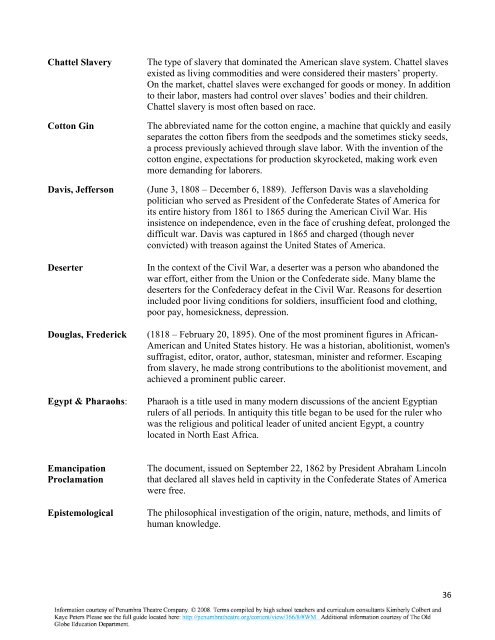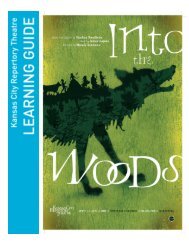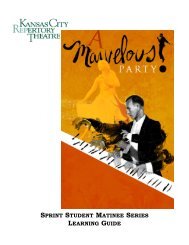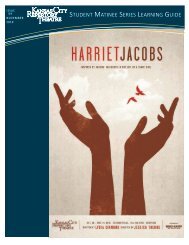Student Matinee Series Learning Guide - The Kansas City Repertory ...
Student Matinee Series Learning Guide - The Kansas City Repertory ...
Student Matinee Series Learning Guide - The Kansas City Repertory ...
Create successful ePaper yourself
Turn your PDF publications into a flip-book with our unique Google optimized e-Paper software.
Chattel Slavery <strong>The</strong> type of slavery that dominated the American slave system. Chattel slaves<br />
existed as living commodities and were considered their masters’ property.<br />
On the market, chattel slaves were exchanged for goods or money. In addition<br />
to their labor, masters had control over slaves’ bodies and their children.<br />
Chattel slavery is most often based on race.<br />
Cotton Gin <strong>The</strong> abbreviated name for the cotton engine, a machine that quickly and easily<br />
separates the cotton fibers from the seedpods and the sometimes sticky seeds,<br />
a process previously achieved through slave labor. With the invention of the<br />
cotton engine, expectations for production skyrocketed, making work even<br />
more demanding for laborers.<br />
Davis, Jefferson<br />
Deserter<br />
Douglas, Frederick<br />
Egypt & Pharaohs:<br />
Emancipation<br />
Proclamation<br />
Epistemological<br />
(June 3, 1808 – December 6, 1889). Jefferson Davis was a slaveholding<br />
politician who served as President of the Confederate States of America for<br />
its entire history from 1861 to 1865 during the American Civil War. His<br />
insistence on independence, even in the face of crushing defeat, prolonged the<br />
difficult war. Davis was captured in 1865 and charged (though never<br />
convicted) with treason against the United States of America.<br />
In the context of the Civil War, a deserter was a person who abandoned the<br />
war effort, either from the Union or the Confederate side. Many blame the<br />
deserters for the Confederacy defeat in the Civil War. Reasons for desertion<br />
included poor living conditions for soldiers, insufficient food and clothing,<br />
poor pay, homesickness, depression.<br />
(1818 – February 20, 1895). One of the most prominent figures in African-<br />
American and United States history. He was a historian, abolitionist, women's<br />
suffragist, editor, orator, author, statesman, minister and reformer. Escaping<br />
from slavery, he made strong contributions to the abolitionist movement, and<br />
achieved a prominent public career.<br />
Pharaoh is a title used in many modern discussions of the ancient Egyptian<br />
rulers of all periods. In antiquity this title began to be used for the ruler who<br />
was the religious and political leader of united ancient Egypt, a country<br />
located in North East Africa.<br />
<strong>The</strong> document, issued on September 22, 1862 by President Abraham Lincoln<br />
that declared all slaves held in captivity in the Confederate States of America<br />
were free.<br />
<strong>The</strong> philosophical investigation of the origin, nature, methods, and limits of<br />
human knowledge.<br />
36







